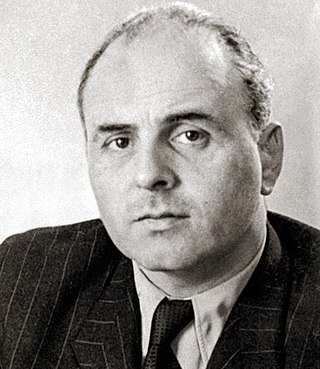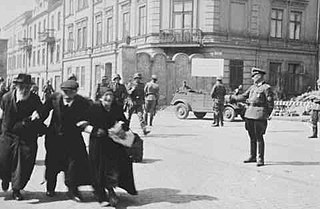
Andrzej Witold Wajda was a Polish film and theatre director. Recipient of an Honorary Oscar, the Palme d'Or, as well as Honorary Golden Lion and Honorary Golden Bear Awards, he was a prominent member of the "Polish Film School". He was known especially for his trilogy of war films consisting of A Generation (1955), Kanał (1957) and Ashes and Diamonds (1958).

The Pianist is a memoir by the Polish-Jewish pianist and composer Władysław Szpilman in which he describes his life in Warsaw in occupied Poland during World War II. After being forced with his family to live in the Warsaw Ghetto, Szpilman manages to avoid deportation to the Treblinka extermination camp, and from his hiding places around the city witnesses the Warsaw Ghetto Uprising in 1943 and the Warsaw Uprising the following year. He survives in the ruined city with the help of friends and strangers, including Wilm Hosenfeld, a German army captain who admires his piano playing.

Stefan Paweł Rowecki was a Polish general, journalist and the leader of the Armia Krajowa. He was murdered by the Gestapo in prison on the personal order of Heinrich Himmler.

Jakub Berman was a Polish communist politician. An activist during the Second Polish Republic, in post-war communist Poland he was a member of the Politburo of the Polish Workers' Party (PPR) and then of the Polish United Workers' Party (PZPR). From 1948, he was considered the second most powerful politician in Poland after President Bolesław Bierut, until he was removed from power in 1956, following Bierut's death.

The Warsaw Ghetto Uprising was the 1943 act of Jewish resistance in the Warsaw Ghetto in German-occupied Poland during World War II to oppose Nazi Germany's final effort to transport the remaining ghetto population to the gas chambers of the Majdanek and Treblinka extermination camps.

The Promised Land is a 1975 Polish drama film directed by Andrzej Wajda, based on the novel of the same name by Władysław Reymont. Set in the industrial city of Łódź, The Promised Land tells the story of a Pole, a German, and a Jew struggling to build a factory in the raw world of 19th-century capitalism.

The Hourglass Sanatorium is a 1973 Polish surrealist film directed by Wojciech Jerzy Has, starring Jan Nowicki, Tadeusz Kondrat, Mieczysław Voit, Halina Kowalska and Gustaw Holoubek. It is also known as The Sandglass in English-speaking countries. The story follows a young Jewish man who visits his father in a mystical sanatorium where time does not behave normally. The film is an adaptation of Bruno Schulz's story collection Sanatorium Under the Sign of the Hourglass. It won the Jury Prize at the 1973 Cannes Film Festival.

Ashes and Diamonds is a 1958 Polish drama film directed by Andrzej Wajda, based on the 1948 novel by Polish writer Jerzy Andrzejewski. Starring Zbigniew Cybulski and Ewa Krzyżewska, it completed Wajda's war films trilogy, following A Generation (1954) and Kanal (1956). The action of Ashes and Diamonds takes place in 1945, shortly after World War II. The main protagonist of the film, former Home Army soldier Maciek Chełmicki, is acting in the anti-Communist underground. Maciek receives an order to kill Szczuka, the local secretary of the Polish Workers' Party. Over time, Chełmicki increasingly doubts if his task is worth doing.

Jewish resistance under Nazi rule took various forms of organized underground activities conducted against German occupation regimes in Europe by Jews during World War II. According to historian Yehuda Bauer, Jewish resistance was defined as actions that were taken against all laws and actions acted by Germans. The term is particularly connected with the Holocaust and includes a multitude of different social responses by those oppressed, as well as both passive and armed resistance conducted by Jews themselves.

Korczak is a 1990 black-and-white biographical war film directed by Andrzej Wajda and written by Agnieszka Holland, about Polish-Jewish humanitarian Janusz Korczak. An international co-production between Poland, Germany and the United Kingdom, it stars Wojciech Pszoniak as Korczak, with Ewa Dałkowska, Teresa Budzisz-Krzyzanowska, Marzena Trybala, Piotr Kozlowski, Zbigniew Zamachowski and Jan Peszek.

Operation Reinhard in Kraków, often referred to by its original codename in German as Aktion Krakau, was a major 1942 German Nazi operation against the Jews of Kraków, Poland. It was headed by SS and Police Leader Julian Scherner from the Waffen-SS. The roundup was part of the countrywide Aktion Reinhard, the mass murder of Polish Jews in the so-called General Government under the command of SS und Polizeiführer Odilo Globočnik.

Katyń is a 2007 Polish historical drama film about the 1940 Katyn massacre, directed by Academy Honorary Award winner Andrzej Wajda. It is based on the book Post Mortem: The Story of Katyn by Andrzej Mularczyk. It was nominated for Best Foreign Language Film for the 80th Academy Awards.

The Będzin Ghetto was a World War II ghetto set up by Nazi Germany for the Polish Jews in the town of Będzin in occupied south-western Poland. The formation of the 'Jewish Quarter' was pronounced by the German authorities in July 1940. Over 20,000 local Jews from Będzin, along with additional 10,000 Jews expelled from neighbouring communities, were forced to subsist there until the end of the ghetto history during the Holocaust. Most of the able-bodied poor were forced to work in German military factories before being transported aboard Holocaust trains to the nearby concentration camp at Auschwitz where they were exterminated. The last major deportation of the ghetto inmates by the German SS – men, women and children – between 1 and 3 August 1943 was marked by the ghetto uprising by members of the Jewish Combat Organization.

Franz Konrad was an Austrian mid-level commander in the SS of Nazi Germany who was an administrative official responsible for the Werteerfassung or "recording of valuables" in the Warsaw Ghetto. He earned the nickname "the King of the Warsaw Ghetto". In March 1952, Konrad was executed by hanging in Warsaw.

Józef Andrzej Szeryński was a police-colonel in interwar Poland, inspector for the Lublin district and later – in German-occupied Poland during the Second World War – the commander of the Jewish Ghetto Police in the Warsaw Ghetto. Szeryński was viewed as a collaborator and traitor by the Jewish underground in the Warsaw Ghetto. The chairman of the Warsaw Ghetto's Jewish Council Adam Czerniaków selected Szeryński to create the Jewish Ghetto Police in 1940. Szeryński was arrested by the German Gestapo on May 1, 1942, for smuggling furs out of the Warsaw Ghetto for personal gain. He was released on the condition of leading the deportation action to Treblinka extermination camp in July 1942. The very next month Jewish underground attempted to assassinate him, unsuccessfully. He remained at the helm of the Ghetto Police until the end of the Grossaktion Warsaw which claimed the lives of over 254,000 ghetto inmates, men, women and children. He committed suicide right after the next wave of deportations in January 1943.

Walesa: Man of Hope is a 2013 Polish biopic film directed by Andrzej Wajda, starring Robert Więckiewicz as Lech Wałęsa. Wajda stated at Kraków's Off Plus Camera Film Festival in April 2012 that he foresaw trouble following the film's release. The film was selected as the Polish entry for the Best Foreign Language Film at the 86th Academy Awards, but was not nominated.

Jewish Motifs International Film Festival is a major Jewish-themed film festival held annually in Warsaw, Poland. The festival has been held every year since 2004.

Alina Janowska was a Polish actress. She appeared in more than 35 films and television shows between 1946 and 2017.



















